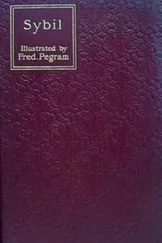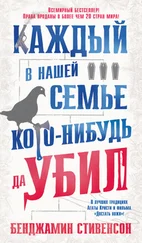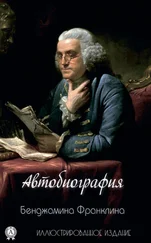‘I’ll do worse.’ He points the gun at her face, its barrel level with her nose. ‘So let’s start with the basics. You come from criminals.’
‘I don’t talk about my family.’
He points upward, fires again. The bullet explodes through the roof and whistles in the air outside. Bruna screams. With one hand, she pulls the comforter up over her shoulders again; she holds the other out straight, her palm facing Daniel like a stop sign.
‘ Drabarimos , it’s a gift from God. My family wasn’t using it right. They’re backward, they’re dishonest, they hit and run. I don’t do nothing like that. I talk about life, and God’s blessings.’
‘You know they’re locked up, don’t you? You know they’ve been caught?’
‘I heard. But I don’t talk to them. I got nothing to do with it.’
‘Bullshit. You stick together, you people, like rats.’
‘Not me,’ says Bruna. ‘Not me.’
When Daniel lowers his gun, she drops her hand. In her eyes, Daniel sees a gloss of tears. Perhaps she’s telling the truth. Perhaps her family feels as remote to her as Klara and Simon and Saul do to Daniel – like part of another lifetime.
But he can’t become soft. ‘Is that why you left home?’
‘That’s part.’
‘Why else?’
‘ ’Cause I was a girl. ’Cause I didn’t wanna be nobody’s wife, nobody’s mother. Starting seven years old, you’re cleaning the house. Eleven, twelve, you’re working; fourteen, married. Me, I wanted to go to school, be a nurse, but I didn’t have no education. All it was was “ Shai drabarel, shai drabarel? ” Can she tell fortunes. So I ran. I did what I knew, I gave readings. But I says to myself, I’ll be different. No charge if I don’t have to. No witchcrap. There was a client I had for years, I didn’t ask her once to pay me. I says to her, “Teach me. Teach me how to read.” She’s laughing: “Palms?” “No,” I tell her. “The newspaper.” ’
Bruna’s mouth quivers. ‘I’m fifteen,’ she says, ‘living in a motel. I can’t write an advertisement. I can’t read a contract. I’m learning, but I look at what you got to do to be a nurse, college and like that, and here’s me leaving school at seven. I know I can’t do it; I know it’s too late. So I says to myself, Okay, I have the gift – I still have that. Maybe it’s all how I use it.’
At the end of this monologue, she deflates. He can tell how miserable she is, forced to share it with him.
‘Keep going,’ he says.
Bruna inhales with a wheeze. ‘I wanted to do something good. So I think, Okay: What do nurses do? They help people, people who suffer. Why do they suffer? ’Cause they don’t know what’s gonna happen to them. So what if I can take that away? If they have answers, they’ll be free, is what I thought. If they know when they’ll die, they can live.’
‘What do you want from the people who come to you? Not money – so what?’
‘Nothing.’ Her eyes bulge.
‘Bullshit. You wanted power. We were kids, and you had us eating out of the palm of your hand.’
‘I didn’t make you come.’
‘You advertised your services.’
‘I did not. You found me.’
Her face is animated and indignant. Daniel tries to remember if this is true. How did he hear of her? Two boys in a deli. But how did they hear of her? The trail must lead back to Bruna.
‘Even if that were true, you should have turned us away. We were children, and you told us things no child should hear.’
‘Kids, they all think about death. Everyone thinks about it! And the ones that make their way to me – they got their reasons, every one of ’em, so I give ’em what they came for. Children are pure in their wishes – they got courage; they want knowledge, they’re not afraid of it. You were a bold little boy, I remember you. But you didn’t like what you heard. So don’t believe me, then – don’t believe me! Live like you don’t believe me.’
‘I do live like that. I do.’ He’s veering off track. It’s the fatigue and the cold – how does Bruna stand it? – the drive, the thought of Mira finding his cell phone on the floor. ‘Do you know your own future? Your own death?’
Bruna appears to be shuddering until he realizes she’s shaking her head. ‘No, I don’t know it. I can’t see myself.’
‘You can’t see yourself.’ A cruel pleasure blooms in Daniel. ‘That must drive you insane.’
She’s his mother’s age, his mother’s size. But Gertie is robust. Somehow, Bruna looks both bloated and frail.
He aims his gun. ‘What if it’s now?’
The woman gasps. She puts her hands over her ears, and the comforter falls to the floor, revealing her nightgown and bare legs. Her feet are crossed at the ankle and pressed together for warmth.
‘Answer me,’ says Daniel.
She speaks thinly, from the upper register of her throat. ‘If it’s now, it’s now.’
‘It doesn’t have to be now, though,’ he says, fingering the gun. ‘I could do it any time. Show up at your door, you’d never know when I was coming. Which would you rather? Going now, or never knowing when? Waiting, waiting, walking on tiptoes – looking over your shoulder every fucking day, sticking around while everyone around you dies and you wonder whether it should’ve been you, and hating yourself because –’
‘It’s your day!’ shouts Bruna, and Daniel is startled by the change in her voice, how it becomes lower and more confident. ‘Your day, it’s today. That’s why you’re here.’
‘You think I don’t know that? You think I didn’t do this intentionally?’ he says, but Bruna is looking at him with a dubiousness that suggests another narrative: one in which he did not come intentionally at all but was compelled by the very same factors as Simon and Klara. One in which his decision was rigged from the start, because the woman has some foresight he can’t understand, or because he is weak enough to believe this.
No. Simon and Klara were pulled magnetically, unconsciously; Daniel is in full possession of his faculties. Still, the two narratives float like an optical illusion – a vase or two faces? – each as convincing as the other, one perspective sliding out of prominence as soon as he relaxes his hold on it.
But there is one way he can make his own interpretation become permanent, the other fading into what was before, or might have been. He isn’t sure whether the idea just occurred to him or whether it’s been inside him since he saw her photograph.
The woman’s eyes flick to the left, and Daniel goes still. At first, he only hears the rush of the waterfall, but then another noise becomes apparent: the slow, padded crunch of feet in the gorge.
‘Don’t move,’ he says.
He walks to the cab. When his eyes adjust to the dark, he sees a black mass moving quickly through the narrow passage.
‘Get out,’ says Bruna. ‘Go.’
The footsteps are becoming closer now, faster, and his pulse begins to speed.
‘Daniel?’ calls a voice.
The map to West Milton on his computer screen. The business card by the mouse pad. Mira must have found them. She must have called Eddie.
‘Daniel!’ Eddie shouts.
Daniel moans.
‘I told you get out,’ Bruna says.
But Eddie is too close. Daniel sees a figure scrambling up over the edge of the gorge and into the clearing. His stomach rises and turns. He slams Bruna’s folding table up toward the wall so that the boxes fall to the floor. The metal folding chairs collapse on top of them.
‘All right,’ snaps Bruna. ‘That’s enough.’
But Daniel can’t stop. He is alarmed by his own fear, by the deep unstoppable rush of it. It is not him, it is not his: he must cut it out at the root. He walks to the counter beside the sink and uses the barrel of his gun to knock the religious icons to the floor. He empties the boxes in the front seats, dumping their contents – newspapers and canned food, playing cards and tarot cards, old papers and photographs – on the ground. Bruna is shouting now, rising heavily from the couch, but he moves past her to the bedroom door. He rips the wooden cross from its peg and slams it into the wall of the trailer.
Читать дальше
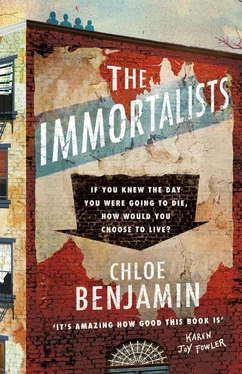

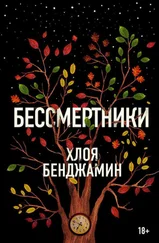

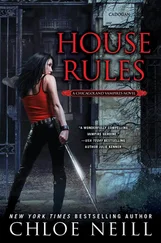
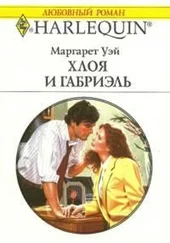
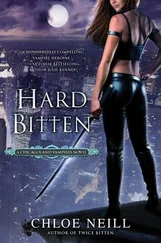

![Мелани Бенджамин - Госпожа отеля «Ритц» [litres]](/books/384861/melani-bendzhamin-gospozha-otelya-ritc-litres-thumb.webp)
